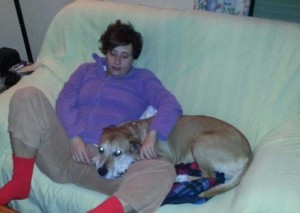
(Reuters) – The health of a Spanish nurse with Ebola worsened on Thursday and four other people were put into isolation in Madrid, while the government rejected claims that its methods for dealing with the disease weren’t working, and blamed human error.
Teresa Romero, 44, is the first person to have contracted Ebola outside of Africa, after becoming infected by one of two Spanish priests repatriated from Africa with the disease.
In total, eight people were in isolation in Madrid, though only Romero had tested positive for Ebola. The others included her husband, two doctors who cared for her and an emergency services worker who had direct contact with her.
Three other people were released from the isolation unit on Wednesday after testing negative.
A health official at the Carlos III Hospital, where Romero was being treated, said her “clinical situation has deteriorated”, but at her request gave no further details.
The European Commission asked the Spanish government for an explanation of how Romero’s infection could have happened in a high-security ward.
Ruben Moreno, health spokesman for the ruling People’s Party, said Romero had told another doctor at the hospital that she had touched her face with her protective gloves.
“It’s obvious that the patient herself has recognized that she did not strictly follow the protocol,” he said in a television interview.
Health workers — whose unions have called for Health Minister Ana Mato to resign — said the training and protective suits provided to hospital staff had been inadequate.
One nurse who worked alongside Romero on the isolation ward while caring for the priests said the government was trying to avoid blame.
CARERS UNDER PRESSURE
“We are really angry,” Elena, who declined to give her second name, said outside the gates of the Carlos III Hospital. “She is the victim, and they are criminalizing her as if she was the one responsible for all that has happened.”
Another doctor, who cared for Romero and was among those now in isolation, said the sleeves on the protective suit he wore while handling her had been too short.
In a letter to healthcare authorities, published by national newspaper El Pais, the doctor detailed treating Romero while on a grueling 16-hour shift during which he was not told she had the Ebola virus. He said he only learned of this via the press.
The hospital cleared its fourth floor to accommodate around 10 workers caring for those in isolation on the sealed-off sixth floor.
A British man showing symptoms of the Ebola virus died on Thursday in Macedonia, where authorities sealed off his hotel, keeping another Briton and hotel staff inside.
Britain had earlier announced it would start screening passengers entering through London’s two main airports and the Eurostar rail link with Europe for possible Ebola infections.
The European Union is discussing the introduction of airport screening, something the U.S. government ordered at five major airports after the first person diagnosed with Ebola in the United States died on Wednesday.
Currently, passengers at airports in Africa must fill out questionnaires and be checked for high body temperature, one of the symptoms of infection.
The virus has killed nearly 4,000 people in West Africa since March in the largest outbreak on record. It causes hemorrhagic fever and is spread through direct contact with body fluids from an infected person.
The World Health Organization has said it sees no evidence of the disease being brought under control in Liberia, Sierra Leone and Guinea.
SPAIN SHAKEN
News that Ebola has been passed on in Spain has shaken faith in the Spanish health system, which has suffered deep spending cuts as part of austerity measures.
Although there are no signs of panic in Madrid, one resident in the suburb where Romero lived said some people had canceled hospital appointments, and some parents had kept their children away from the nursery near the health center where she had first gone complaining of fever.
“A lot of children did not turn up … and some canceled hospital appointments as precaution,” said Josefa Sierra, 67, member of a neighbor’s association in the Madrid suburb of Alcorcon.
“Of course people are talking of little else when you go to do the shopping at the supermarket,” she said. “But there’s no panic, no. It’s not as though people are staying at home.”
While newspapers run columns and diagrams on the life-cycle of the virus, Prime Minister Mariano Rajoy has called for calm and said a major outbreak is extremely unlikely.
The investigation into how Romero contracted the disease continues. A spokesman for the Madrid health department said the ambulance that collected Romero from her home, while disinfected between trips, went on to carry other patients to hospital without being taken out of circulation until she was known to have contracted Ebola.
Patients carried in the ambulance were unlikely to have caught the disease as they did not have direct contact with the nurse, but were being monitored, the spokesman said. He could not say how many patients had traveled in the ambulance, although press reports put the number at seven.
(Additional reporting by Emma Pinedo and Marco Trujillo in Madrid, Tom Miles in Geneva and Tom Koerkemeier and Victoria Bryan in Brussels; Editing by Sophie Walker and Kevin Liffey)







